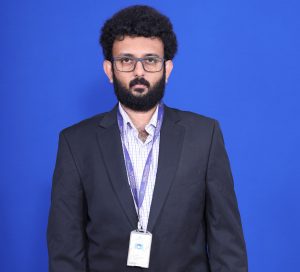BACHELOR OF COMMERCE
- About Department
- Vision & Mission
- HOD’s Message
- PO’s PEO’s & PSO’s
- Faculty
- Syllabus – Physics
- Syllabus – Mathematics
- Syllabus – Computer Science
The Department of B.Sc in Physics, Mathematics, and Computer Science offers a comprehensive interdisciplinary program, providing students with a profound understanding of fundamental principles in physics, mathematics, and computer science by encouraging a holistic approach to problem-solving, analytical thinking and practical skill development. In the department, students are engaged in interdisciplinary projects which often involve the application of mathematical modeling, computational simulations, and physics experiments, allowing students to explore the practical implications of their theoretical knowledge. To support practical learning, the department provides state-of-the-art laboratories, computing facilities, and access to relevant software tools. These resources enable students to conduct experiments, simulations, and collaborative projects that bridge the gap between theoretical knowledge and practical application.
Vision
To create a community of highly skilled and innovative professionals, who can contribute to scientific research, technological advancement, and societal well-being.
Mission
- To provide a comprehensive education that emphasizes critical thinking, problem-solving, and
- To equip students with a strong foundation in theoretical and practical aspects of physics, mathematics, and computer science through laboratory experiments, research projects, and
- To develop the necessary skills and competencies required for scientific research, innovation, and

Mr. Ajith S
I/C HOD – Department of Science
Welcome to the Department of B.Sc, We are delighted to have a dedicated team of highly qualified faculty members committed to shaping the future leaders in the fields of Physics, Mathematics, and Computer Science. Your journey with us promises to be an enlightening experience.
We go beyond academics by encouraging you to delve into the world of research and innovation. Our department fosters a culture of curiosity, pushing you to explore, question, and create.
Prepare for an exciting and enriching journey. Together, we’ll explore the limitless possibilities of the scientific world and work towards making a meaningful impact.
Wishing you a fantastic learning experience!
Programme Outcome (PO)
PO 1: To be proficient in using mathematical and computational tools to model and analyze physical phenomena, and be able to apply this knowledge to real-world problems.
Programme Educational Objectives (PEO’s)
PEO 1: To develop strong quantitative skills, including the ability to analyze data, use mathematical modeling, and perform calculations.
PEO 2: To develop proficiency in conducting experiments, collecting and analyzing data, and interpreting the results.
PEO3: To develop research skills, including the ability to conduct independent research, review scientific literature, and apply research methods to solve problems.
Programme Specific Outcome (PSO’s)
PSO1: Analyze, interpret and evaluate scientific literature and research findings.
PSO2: Gain practical experience through laboratory experiments, simulations, and research projects.
PSO3: Interpret scientific data using statistical and computational methods.
Sl. No | Name of the Faculty | Qualification | Designation | Experience in Yrs. | Specialization | Articles published in ISSN/ISBN | Paper Presented in Conference |
1 | Mrs.Vidyashree H R | M.Sc (Mathematics), B.Ed, (Ph.D) | Assistant Professor | 9 | Graph Theory, Computational Mathematics, Number Theory, Game Theory | 9 | 6
|
2 | Dr. Thejas R | M.Sc., Ph.D (Physics) | Assistant Professor | 4 | Material Science, Nuclear Physics, Electronics | 0 | 0 |
3 | Dr. Rakesh Bharathi
| MSc, B.ED, Ph.D. | Assistant Professor | 2.5 years as visiting faculty | Topology, Functional Analysis, Measure Theory | 8
| 3
|
4 | Mr. Ananda S D | M.Sc (B.Ed) (Physics) | Assistant Professor | 1 | M.Sc in Nuclear Physics & Electronics | 1 | 1
|
5 | Mr. Srinidhi L | M.Sc(Mathematics), (B.Ed) | Assistant Professor | 0.7 | Complex Analysis | 0 | 0 |
